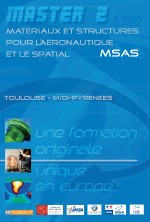Materials and Structures for AerospaceMSAS for the French "Matériaux et Structures pour l’Aéronautique et le Spatial"
Degree level: LMD/Master 2
Field(s) of education LMD: Science - technologies - health
Major(s): Materials science
Specializations: Materials and structures for the aerospace
Outgoing level: Master level
Location: TOULOUSE
Leads to a qualification - national degree
Possible in: initial course / Continuing education/ VAE (accreditation for work experience)
Objectives
The “Materials and Structures for Aerospace” Master's degree aims at training high-level executives who have expertise in the technical aspects of the implementation, the control and the follow-up of metallic, ceramic and composite materials for the aerospace industry.
The course was implemented by Université Paul Sabatier with different partners in 2007. It benefited from the dynamic generated from being awarding the international label “competitiveness cluster" "Aéronautique, Espace et Systèmes Embarqués" (AESE or Aerospace Valley) and from the high number of engineering schools and education centres in the aerospace field (ISAE, INSA, INPT, ENSTIMAC, etc…). The course is now supported by the competitiveness cluster.
The aerospace industry is strongly established in Europe and in particular in France. Its performances are closely linked to the mastery of materials which are used for aircraft, helicopters, booster rockets or satellites. There is great diversity of materials. They can be structural or functional. Their choice and the improvement of their properties are one of the major challenges of the strategic development of the aerospace industry. The first year of the curriculum focuses on the fundamentals of the materials’ families and their properties. The second year offers a highly specialized course on cell materials or structural materials. It gathers the most eminent educational and industrial regional skills, including the substantial means available in the region (unique trial means in Europe at the DGA-TA, space simulation means specific to the ONERA, advanced technical and industrial tools).
Skills
Scientific and technical knowledge
- Designing new families of materials among metals and alloys, ceramics, polymers, composites (CMO, CMM, CMC) to meet the expectations of the aerospace sector.
- Understanding the structural requirements of a material in order to choose the most adapted materials for a function in an aircraft.
- Coordinating and supervising major programmes which require skills in both materials and structures.
- Developing a good expertise on the behaviour of materials in use (mechanical, tribological durability, environmental stress – corrosion, abrasion, deterioration…).
- Designing means for specific characterization (tools and methods to analyze materials’ and structures’ failure, damaging means for heated parts, physical principle of non-destructive techniques applied to aerospace structures…).
- Guaranteeing compatibility between the new processes of fabrication developed and the technical, economic and environmental constraining requirements.
- As soon as the design step, foreseeing the requirements linked to Materials Certification (writing of the associated specifications).
- Analyzing failures during operation (post-incident and accident analysis). Taking an inventory of the future trends in aerospace technologies (adaptive materials, emerging processes, new assembling techniques) and imagining innovative solutions.
- Knowing the environment of the company and its constraints during the long work placement (6 months) and the presentations of external speakers during the curriculum in order to be able to fit in teams of research and development, engineering study, production, … in SMEs and big corporate groups in the aerospace field.
Admissions
Required diplomas
- Master 1 ( "Materials" or "Design and calculation of structures") of Université Paul Sabatier or of other French universities.
- 4 years of higher education in partner engineering schools (INSA Toulouse and Mines d'Albi).
- Master 1 or an equivalent degree from a foreign university.
Programme
Education programme of the 1st semester (30 ects)
- Basic knowledge in aeronautic materials and structures (48h - 3 ects)
- Behaviour of aeronautic structures in use (72h - 6 ects)
- Shaping and experimental characterisation of materials (72h - 3 ects)
- Aeronautic materials processes (72h - 6 ects)
- Materials certification and analysis of the failures in use (48h - 3 ects)
- Future trends in aeronautic techniques (48h - 3 ects)
- Further skills (job seeking, security legislation) (36h - 3 ects)
- Scientific and technical English (24h - 3 ects)
Education programme of the 2nd semester (30 ects)
- Internship (6 months - 30 ects)
Prospects
candidates in M1
Recruitment to the Master 1 Materials Science and Engineering occurs on review of applications. The recommended degrees for admission are chemistry and physics-chemistry (or equivalent in France or abroad).
candidates in M2 MSAS
For external submissions for the mention M1, training in the field of materials (in France or abroad) is strongly recommended. Apply directly on the website of the University. The site opens in general around mid-March, responses are provided in June or early July.





